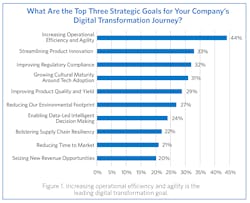Half of the world's population currently lacks access to essential health care, and the demand for vaccines and other vital medicines continues to rise. With global population levels projected to reach nearly 10 billion by 2050, the gap between health care needs and services will only widen if left unaddressed.
Pharmaceutical companies are among those at the forefront of solving this challenge. The Access to Medicine Foundation’s Access to Medicine Index compares 20 of the world’s leading research-based pharma companies based on their efforts to improve access to medicine in low- and middle-income countries.” According to the 2022 Index, “companies are increasingly putting access plans in place before launching new products, but analysis shows plans have limited depth and breadth.”
Digitalization can help speed up drug discovery, optimize production, and advance smart manufacturing processes, but it’s not always an easy step for companies, nor easily sustained. New research from AspenTech, in collaboration with FT Longitude, shows that while pharma businesses continue to accelerate digital initiatives, many companies have yet to implement an integrated digital transformation strategy to meet growing demand. Digitalization will be a key enabler in allowing pharma companies to support their global access to medicine strategies.
Progress toward smart manufacturing
The research emphasizes just how much of a priority digital initiatives have become for pharma. Today, 44% of pharma companies say increasing operational efficiency and agility is their organization's leading digital transformation goal (Figure 1). Streamlining product innovation and improving regulatory compliance round out pharma decision-makers’ top three goals, echoing calls for improved manufacturing operations.Smart manufacturing, which relies on automation, computing and other technologies to use data to improve manufacturing processes and decision- making, will help pharma companies achieve these strategic advancements in several critical areas.
Notably, it can help optimize strategies in low- and middle-income countries where access and availability of medical treatment is critically needed, but difficult to accomplish. Better data insights throughout the drug manufacture process can improve early decision- making around how a drug or vaccine will be developed, manufactured, shipped, and administered in a remote area of the world.
Smart manufacturing also helps seize opportunities around emerging markets for biologics, cell and gene therapies and other personalized medicines that require high levels of flexibility and manufacturing agility. Sixty percent of companies expect cell and gene therapies and biologics to be the industry’s fastest-growing revenue opportunities in the next five years.
Challenges — and opportunities — of digital transformation
Digitalization is improving the efficiency and visibility of drug manufacture, which is poised to have a positive impact on business opportunities and access to medicine strategies. While challenges remain, pharma manufacturers are prioritizing digitalization and new strategies that improve cultural maturity around technology:
Improving cultural maturity
The pharma industry still faces cultural immaturity around digital transformation. Thirty-five percent of pharma companies experience risk aversion when it comes to digital initiatives and nearly one in four (23%) companies shared that C-suite changeovers limit the progress of digital initiatives. C-suite departures can impact the entire enterprise, resulting in adjustments to company structure, staff roles, and strategic priorities and investments. As a result, pharma professionals recognize the need to continually develop their cultural maturity around tech adoption — addressing that challenge is a top digital transformation goal for the industry. In the example of gaining C-suite buy-in, this means presenting clearly defined strategies and progress against KPIs, and partnering with technology providers that will help create business cases that show ROI.Increasing cloud usage
More pharma companies are turning to the cloud to improve agility and efficiency. Forty-four percent say increasing usage of the cloud and other SaaS solutions is the most important step to improve operational agility and meet market demands in the next 3-5 years — the highest of all priorities surveyed. Cloud deployments improve data access, visibility across departments and between partners, and enable more informed data analysis and decision-making.Upskilling and retaining talent
Respondents were split on whether or not they’re finding it challenging to secure and retain the talent they need. Pharma companies, especially in the U.S., are prioritizing the recruitment of top talent in order to improve operational agility. AI, automation, and other advanced technology will make it easier for pharma businesses to fill in the gaps and upskill current employees, especially as pilot projects are scaled up to create value across the organization.Accelerating continuous manufacturing and process intensification
Recent FDA research shows that continuous manufacturing processes could accelerate medicine production timelines in the U.S. by several months compared to the batch framework widely used today. These efficiencies provide faster access to medicines, as well as cost savings without risking product quality.Pharma has lagged behind other process industries in this area, but, with improving access to medicine and opportunities like biologics and cell/gene therapies top of mind, the industry recognizes a need for greater agility and supply chain resiliency. Pharma is considering how continuous production will help free up floor space and flex to deliver varied therapy modalities.
Pharma’s digital revolution
As pharma manufacturers work to meet global health care demands and expand access to medicines, they face a complex and dynamic landscape. The right strategy that incorporates digital technology, culture improvements, and skilled employees, can play an important role in overcoming today’s logistical and production challenges — and set the stage to advance healthcare into the future.
The question is no longer whether or not to embrace smart manufacturing, but rather how your digital strategy will prepare your organization, and the global communities it serves, for long-term success.







